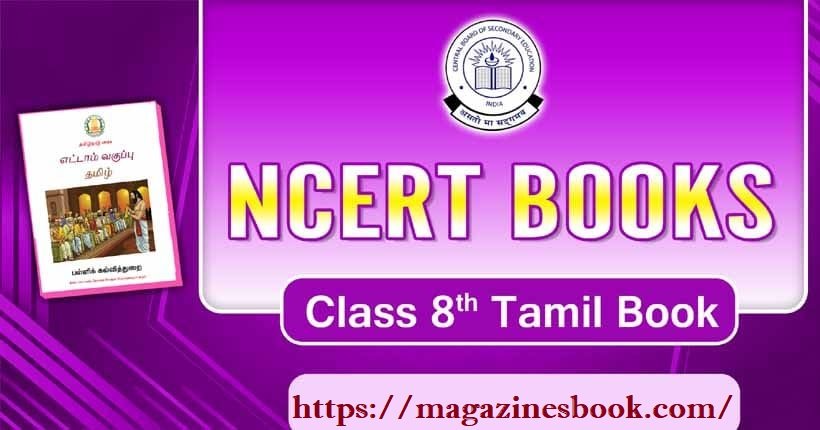8th Tamil Book: Complete Guide to Syllabus, Chapters & Study Tips
Tamil is one of the oldest and richest languages in the world. In the 8th-grade curriculum, the Tamil book plays a crucial role in developing students’ reading, writing, and comprehension skills. This article provides a detailed guide on the 8th Tamil book, including its syllabus, chapters, grammar topics, important questions, and study tips to help students excel in their studies.
Overview of the 8th Tamil Book
The 8th Tamil textbook is designed to enhance students’ linguistic and literary skills. It includes prose, poetry, grammar, and supplementary reading materials that help improve vocabulary, reading comprehension, and creative writing skills.
| Feature | Details |
|---|---|
| Language | Tamil |
| Grade Level | 8th Standard |
| Board | Tamil Nadu State Board & CBSE (varies by syllabus) |
| Subjects Covered | Prose, Poetry, Grammar, Supplementary Reading |
| Exam Format | Objective, Short Answers, Long Answers, Essay Writing |
| Skills Developed | Reading, Writing, Speaking, Grammar, Literary Appreciation |
8th Tamil Book Syllabus
The syllabus is structured to cover different aspects of Tamil literature, including classical and modern works. The book is divided into Prose, Poetry, and Supplementary Reading sections.
1. Prose Section
The prose section contains short stories, historical narratives, and moral lessons that enhance critical thinking and language skills.
| Chapter No. | Chapter Name | Theme |
| 1 | நல்லவை சொல்லுக (Nallavai Solluga) | Importance of speaking good words |
| 2 | கர்ணன் ஒருவன் (Karnan Oruvan) | Story of Karna from Mahabharata |
| 3 | அன்னை திரும்பப் பெறல் (Annai Thirumbap Peral) | Mother’s love and sacrifice |
| 4 | தேசபக்தி (Desa Bhakti) | Patriotism |
| 5 | வாழ்க்கை ஒரு பயணம் (Vaazhkai Oru Payanam) | Life as a journey |
2. Poetry Section
Tamil poetry is rich in literary beauty and cultural significance. The poetry section introduces students to classic and modern Tamil poets.
| Poem Name | Poet | Theme |
| பசுமை (Pasumai) | பாரதியார் | Nature and beauty |
| உறவின் முள்ளு (Uravin Mullu) | வள்ளலார் | Relationships and emotions |
| வெற்றி நம்முடையது (Vettri Nammodiyathu) | திருவள்ளுவர் | Success and determination |
| தமிழ் மொழி மகிமை (Tamil Mozhi Magimai) | சுப்பிரமணிய பாரதி | Glory of Tamil language |
3. Supplementary Reading
Supplementary lessons focus on historical events, biographies, folk tales, and real-life stories that inspire students.
| Story Name | Content Type |
| வீர தமிழர் (Veera Tamilar) | Story of brave Tamil warriors |
| காந்தியின் வாழ்க்கை (Gandhiyin Vaazhkai) | Biography of Mahatma Gandhi |
| பழந்தமிழர் நாகரிகம் (Pazhantamilar Nagarikam) | Ancient Tamil civilization |
| இயற்கை மகிமை (Iyarkai Magimai) | Importance of nature conservation |
Grammar Topics in 8th Tamil Book
The Tamil textbook also includes comprehensive grammar lessons to enhance language skills.
| Grammar Topic | Concepts Covered |
| சொற்கள் (Words) | Synonyms, Antonyms, Word formation |
| பெயர்ச்சொல் (Noun) | Types of Nouns, Usage in Sentences |
| வினைச்சொல் (Verb) | Tenses, Verb Forms |
| பயனுள்ள சொற்றொடர்கள் (Useful Phrases) | Idioms and Proverbs |
| எழுத்தியல் (Writing Skills) | Letter Writing, Essay Writing |
Exam Pattern & Important Questions
The Tamil exam consists of different sections to assess students’ reading, writing, and analytical skills.
| Section | Type of Questions | Marks |
| Section A | Multiple Choice Questions (MCQs) | 10 Marks |
| Section B | Short Answer Questions | 20 Marks |
| Section C | Long Answer Questions | 30 Marks |
| Section D | Essay Writing / Letter Writing | 20 Marks |
| Section E | Grammar | 20 Marks |
Sample Important Questions
- பாடலின் முக்கியமான கருத்து என்ன? (What is the main theme of the poem?)
- கண்ணதாசன் எழுதிய ஒரு கவிதையை விளக்குக. (Explain a poem written by Kannadasan.)
- தமிழின் வளமை பற்றி கட்டுரை எழுதுக. (Write an essay on the richness of the Tamil language.)
- மகாத்மா காந்தியின் வாழ்க்கையிலிருந்து ஒரு பாடம். (A lesson from Mahatma Gandhi’s life.)
- சொற்களின் வகைகளை விளக்குக. (Explain different types of words in Tamil grammar.)
Study Tips for 8th Tamil Book
- Daily Reading Practice: Read one prose or poem every day to improve comprehension.
- Summarization: Write a short summary of each chapter to remember key points.
- Memorization of Poems: Understand the meaning behind the lines and recite them regularly.
- Grammar Practice: Solve grammar exercises and worksheets to strengthen language skills.
- Mock Tests: Attempt sample question papers to improve time management.
- Group Discussions: Discuss lessons with friends or teachers to gain new insights.
- Essay Writing Practice: Regularly practice essays and letters to enhance writing skills.
Conclusion
The 8th Tamil book is an essential resource that helps students develop strong linguistic and analytical skills. By understanding the syllabus, practicing regularly, and following effective study strategies, students can master the Tamil language with confidence.
